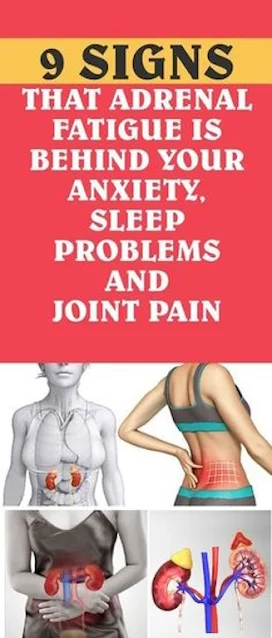The following symptoms point to the need for you to slow down and take better care of your health, even though doctors won't label them as conditions.
If adrenal fatigue is not addressed, one develops adrenal insufficiency, a serious condition that a specialist can identify. Chronic stress causes cortisol levels to remain elevated and weaken the body.
In order to address the problem before it becomes a significant health concern, it is crucial to be aware of these nine indicators of adrenal fatigue:
Feeling Overwhelmed By Life
We all put too much stress into our everyday life, and instead of taking some time to relax and enjoy life, we get more and more tasks that will eventually lead to a burnout!
Yet, you need to take some self-care and focus on yourself only. Take a step back and your adrenals will return the favor soon!
Digestion issues
In the case of stress, the body is not fully focused on digestion and absorption of nutrients, and the metabolism is slowed down. This causes bloating, weight gain, constipation, diarrhea, and indigestion.
You should start the day with a glass of lemon water to help digestion, and drink plenty of water throughout the day. Also, take probiotics, eat slowly, and consume a nutrient-rich diet.
Sleep deficiency
Our body needs 8-10 hours of uninterrupted sleep each night, to reset and recharge, so we can get up feeling fresh and full of energy. Yet, we all postpone our sleep in order to manage to accomplish everything, and this causes a harmful imbalance in the system.
You should go to bed by 10:30 pm every night, and avoid using any gadgets before going to sleep. Being in the dark will stimulate the production of melatonin or the sleep hormone, which will help you fall asleep easily.
You can also try meditation or take a warm bath before sleeping.
Stiffness and soreness
Stress leads to stiffness and pain in the body, especially in the back, neck, or jaw.
To relieve these symptoms, you should optimize your sleeping habits, do stretches and yoga, and relax in a warm bath with some essential oils to soothe muscles and detoxify the body.
Tiredness After the Workout
Exercise should make you full of energy, not tired and exhausted. Physical stress is a stressor for the adrenal glands, so you should not exercise excessively since it can provide opposite effects of the desired ones.
If you are too tired after your workout, you should try something gentler, like yoga, walking, and stretching.
Salt Cravings
Another symptom of adrenal fatigue is the craving for salty snacks, as the body lacks sodium and other minerals.
The reduced production of aldosterone (the salt-retaining hormone) causes heart palpitations, salt cravings, high blood pressure, and dizziness/lightheadedness upon standing.
Therefore, use a high-quality Himalayan pink salt in cooking, and increase the intake of seaweeds like nori, dulse, and kelp.
Anxiety and depression
Busy lifestyles and stress promote anxiety, and depression, and the adrenal hormones play a role in mood, mental states, and the cognitive function. Therefore, take some time and reduce stress, relax, and calm your mind.
Need for Caffeine
Coffee cannot provide body energy, and it only stimulates the brain for a short time and then weakens the adrenals. Instead, it keeps the body in the stress mode and stimulates the release of stress hormones such as cortisol and epinephrine.
People who drink a cup of coffee in the morning know that the feeling of high energy levels wears off very soon, and they end up feeling more tired than before.
Instead, drink a cup of some herbal tea in the morning to support the recharge of the body.
Hormonal imbalance
In the case of a chronic stress, the hormone precursor material is redirected for use in the production of cortisol, and this causes hormonal imbalances.
Adrenal fatigue affects the function of the thyroid, so you might experience symptoms of hypothyroidism, such as dry skin, poor circulation, weight gain, fatigue.
In these cases, women often suffer from more intense PMS symptoms and have irregular menstrual cycles. To restore the balance in the body, sleep well, drink plenty of water, avoid caffeine, reduce stress, use adaptogenic herbs, and eat a nutrient-dense diet.

